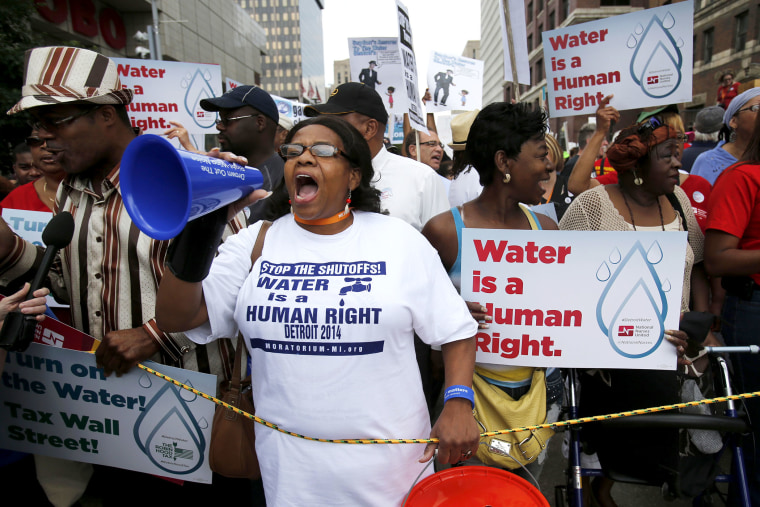Over the past several months, thousands of Detroit residents have lost their access to running water. Thousands more protesters have taken to the streets, demanding that the city turn the water back on. And now Detroit's elected officials are implementing a plan intended to slow the pace of the shutoffs.
The city of Detroit will adopt a 10-point plan intended to slow the pace of water shutoffs, Mayor Mike Duggan announced Thursday. The new strategy includes a new payment plan, expanded financial assistance for those who can't afford their bill, and measures to ensure residents know when their water is in danger of getting turned off. Duggan's announcement comes amid a temporary moratorium on water shutoffs, following weeks of protest from city residents.
Duggan acknowledged the popular outcry in his statement to the press, saying it had been "a very emotional few weeks in this town, as everybody knows."
"The way this has been handled has not reflected well, but we're not dwelling on what happened before," he said, in an apparent swipe at Detroit's Emergency Manager (EM) Kevyn Orr.
Michigan state law empowers the governor's office to impose emergency management on financially insolvent cities, assigning state-appointed EMs who temporarily assume all the powers of the mayor and city council. Detroit has been governed by EM Kevyn Orr since the spring of last year, although Orr ceded some limited authority to Mike Duggan when the latter was elected mayor in late 2013. Yet Duggan was only able to assume responsibility for Detroit's water supply in late July, when Orr agreed to leave the matter in his hands.
"Had the elected officials been in charge three months earlier, this 10-point plan would have been implemented prior to the shutoffs," said Duggan. "But we're fixing it now, and there's no point in turning back."
Before Duggan assumed control over the city's water issues -- and before the city's moratorium on shutoffs, which it instituted about a week prior to Orr's abdication in water-related matters -- private contractors had been hard at work shutting off water for thousands of Detroit residents. Community members accused the city of acting in bad faith, targeting poorer residents and not giving them sufficient notice that they were behind on their water payments. To address those concerns, Duggan said the city would ensure that residents are notified at least a week before a planned shutoff.
He also announced that the city was revamping its financial assistance for poorer residents, with the help of the charitable organization United Way. Mike Brennan, the president of United Way for Southeastern Michigan, attended the press conference and urged people to donate to the Detroit Water Fund, which his organization had set up to assist poor Detroit residents with unpaid water bills.
Rev. Charles Williams II, president of the National Action Network of Michigan, was among those protesting the water shutoffs before the moratorium went into effect. He described the mayor's plan as "a step in the right direction," but criticized it for not directly addressing the cost of Detroit water bills.
"It's not enough to suggest a plan for those who are shut off without making sure we can keep residents from being shut off by ensuring the prices are affordable," he wrote in an email to msnbc. "So while we applaud the mayor for raising money, increasing staffing and providing access to payment arrangements, the center of this problem is still affordability and it is yet to be addressed."
A spokesperson for the labor union National Nurses United (NNU) -- which has also protested the water shutoffs -- wrote that the NNU had not yet had a chance to review the plan, but that “nothing short of a complete moratorium on shut offs is an adequate solution.”
For his part, Duggan tried to preempt those criticisms in his press conference by saying that the city needed revenue in order to continue providing water.
"When someone says water should be free, I don't know how to filter water and pipe it to somebody's house at no cost," he said. "And right now it is other Detroiters paying for it."
